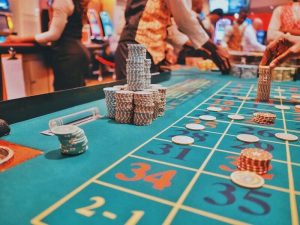
Without a doubt, if there is one piece of technology that has shown to be exciting in recent years, it is virtual reality. Just the thought of it excites the mind and raises questions as to what virtual reality could be used for in the future. There is no doubt that the technology is something straight out of a futuristic film, but this does not mean that it has no useful applications today. It is even being used in the gambling industry and those who are searching for a list of sites to play at can visit https://ukonlinecasinoslist.com/ to access the best options.
VR and gaming
Most people will likely have heard of VR in conjunction with video gaming. This isn’t surprising considering that industrial applications will be lost on those not involved in those industries, but gaming is one community that is universal and extends across the whole Earth. When it comes to VR in gaming, studios have had access to the technology for a while but still have yet to truly utilise the technology in a way that stuns gamers.
As it stands, most of the video games that are playable in VR are nothing new in the sense that they use motion controls and controller input too. However, the idea that players can take their favourite game worlds and exist inside them rather than observing them through the screen will appeal to many, hence the success of gaming VR headsets such as the Oculus Rift.
VR and entertainment
One of the key reasons VR is crucial lies in its transformative impact on the entertainment industry. VR opens up new dimensions for storytelling, gaming, and interactive experiences, providing users with a level of immersion previously thought impossible. Whether exploring fantastical virtual realms or participating in realistic simulations, VR transports individuals to alternate realities with a depth and intensity unparalleled in conventional entertainment formats.
What’s more is that the incorporation of cutting-edge technologies like Volumetric Capture and motion capture enhances the realism of VR experiences by capturing three-dimensional spaces and allowing users to interact with content from multiple perspectives. As VR continues to evolve, its importance in revolutionizing the way we consume entertainment becomes increasingly evident, promising a future where the boundaries between the virtual and the real blur seamlessly.
VR and Real Estate
Virtual reality has revolutionized the real estate industry, offering immersive and innovative ways for both buyers and sellers to engage with properties. Through 360-degree virtual reality tours, prospective buyers can explore homes from the comfort of their own space, experiencing every nook and cranny as if they were physically present. This technology provides an unparalleled level of convenience and saves time for both parties involved in the transaction.
Virtual reality, coupled with 3D Visualisation, enhances this experience by creating lifelike representations of properties, allowing potential buyers to envision their future living space in vivid detail. The use of such technologies not only enhance the property viewing process but also streamline decision-making, making it a valuable tool in the modern real estate market.
VR and military
Virtual reality is only heading in one direction; it aims to recreate real-life as faithfully as possible, to the point where it is indistinguishable. While many might say that this is not something that should be desired given the implications of having such a real-world accessible to all, there is no doubt that having such a powerful tool would be useful to a range of people, especially those in the military.
Already, the military in the UK and the US have begun to use virtual reality in training as the technology allows recruits to experience potentially dangerous situations without exposing them to it in real life. Here, they get the best of both worlds in that they can get useful experience about what to do in a dangerous situation without any risk to life.
VR in education
In education, VR can be an extremely useful tool to use in addition to traditional teaching. This is because it can allow kids with disadvantages to experience things they wouldn’t normally be able to get to witness, such as virtual field trips to a museum or a tour of the solar system. Research has also shown that kids who have ASD respond well to the use of VR. Given the landscape of the world at the moment, VR would also be very useful to those students who are stuck at home due to lockdowns or sickness.
Although the technology is exciting and fun to think of the potential applications, it is still a long way from being able to be fully utilised in the manners suggested here. Given the rate at which technology develops though, there is nothing to say that photorealistic VR won’t be available in the near future.

Hey! Chris here, if you enjoy the content on my blog and would like to add your own, give me a shout through the contact form




